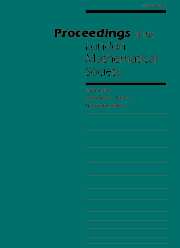Article contents
ASYMPTOTICS FOR THE HEAT CONTENT OF A PLANAR REGION WITH A FRACTAL POLYGONAL BOUNDARY
Published online by Cambridge University Press: 01 May 1999
Abstract
Let $k\ge 3$ be an integer. For $0<s<1$, let $D_s \subset {\Bbb R}^2$ be the set that is constructed iteratively as follows. Take a regular open $k$-gon with sides of unit length, attach regular open $k$-gons with sides of length $s$ to the middles of the edges, and so on. At each stage of the iteration the $k$-gons that are added are a factor $s$ smaller than the previous generation and are attached to the outer edges of the family grown so far. The set $D_s$ is defined to be the interior of the closure of the union of all the $k$-gons. It is easy to see that there must exist some $s_k>0$ such that no $k$-gons overlap if and only if $0<s\le s_k$. We derive an explicit formula for $s_k$.
The set $D_s$ is open, bounded, connected and has a fractal polygonal boundary. Let $E_{D_s}(t)$ denote the heat content of $D_s$ at time $t$ when $D_s$ initially has temperature $0$ and $\partial D_s$ is kept at temperature $1$. We derive the complete short-time expansion of $E_{D_s}(t)$ up to terms that are exponentially small in $1/t$. It turns out that there are three regimes, corresponding to $0<s<1/(k-1)$, $s=1/(k-1)$, and $1/(k-1)<s\le s_k$. For $s \neq 1/(k-1)$ the expansion has the form
$$ E_{D_s}(t)=p_s(\log t)t^{1-d_s/2}+A_st^{1/2}+Bt+O(e^{-r_s/t}), $$
where $p_s$ is a $\log (1/s^2)$-periodic function, $d_s=\log (k-1)/\log (1/s)$ is a similarity dimension, $A_s$ and $B$ are constants related to the edges and vertices, respectively, of $D_s$, and $r_s$ is an error exponent. For $s=1/(k-1)$, the $t^{1/2}$-term carries an additional $\log t$.
- Type
- Research Article
- Information
- Copyright
- 1999 The London Mathematical Society
- 12
- Cited by




